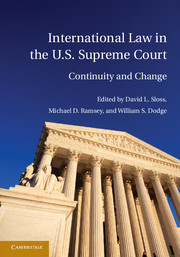Description
International Law in the U.S. Supreme Court
Coordinators: Sloss David L., Ramsey Michael D., Dodge William S.
This book presents a comprehensive account of the Supreme Court's use of international law from the Court's inception to the present day.
Language: English
Subject for International Law in the U.S. Supreme Court:
International Law in the U.S. Supreme Court
Publication date: 08-2012
Support: Print on demand
Publication date: 08-2012
Support: Print on demand
International law in the US supreme court
Publication date: 04-2011
656 p. · 17.8x25.4 cm · Hardback
Publication date: 04-2011
656 p. · 17.8x25.4 cm · Hardback
Description
/li>Contents
/li>Biography
/li>
From its earliest decisions in the 1790s, the US Supreme Court has used international law to help resolve major legal controversies. This book presents a comprehensive account of the Supreme Court's use of international law from its inception to the present day. Addressing treaties, the direct application of customary international law and the use of international law as an interpretive tool, this book examines all the cases or lines of cases in which international law has played a material role, showing how the Court's treatment of international law both changed and remained consistent over the period. Although there was substantial continuity in the Supreme Court's international law doctrine through the end of the nineteenth century, the past century has been a time of tremendous doctrinal change. Few aspects of the Court's international law doctrine remain the same in the twenty-first century as they were two hundred years ago.
Part I. From the Founding to the Civil War: 1. International law in the Supreme Court, 1789–1860 David L. Sloss, Michael D. Ramsey and William S. Dodge; Part II. From the Civil War to the Turn of the Century: 2. Treaties in the Supreme Court, 1861–1900 Duncan B. Hollis; 3. Customary international law in the Supreme Court, 1861–1900 David J. Bederman; 4. International law as an interpretive tool in the Supreme Court, 1861–1900 Thomas H. Lee and David L. Sloss; 5. A social history of international law: historical commentary, 1861–1900 John Fabian Witt; Part III. From the Turn of the Century to World War II: 6. Treaties in the Supreme Court, 1901–45 Michael P. Van Alstine; 7. Customary international law in the Supreme Court, 1901–45 Michael D. Ramsey; 8. International law as an interpretive tool in the Supreme Court, 1901–45 Roger P. Alford; 9. Varieties and complexities of doctrinal change: historical commentary, 1901–45 Edward A. Purcell, Jr; Part IV. From World War II to the New Millenium: 10. Treaties in the Supreme Court, 1946–2000 Paul B. Stephan; 11. Customary international law in the Supreme Court, 1946–2000 William S. Dodge; 12. International law as an interpretive tool in the Supreme Court, 1946–2000 Melissa A. Waters; 13. Global power in an age of rights: historical commentary, 1946–2000 Martin S. Flaherty; Part V. International Law in the US Supreme Court in the Twenty-First Century: 14. Medellin and Sanchez-Llamas: treaties from John Jay to John Roberts Lori F. Damrosch; 15. Sosa and the derivation of customary international law John O. McGinnis; 16. International law and constitutional interpretation in the twenty-first century: change and continuity Mark Tushnet; 17. Empagran's empire: international law and statutory interpretation in the US Supreme Court of the twenty-first century Ralf Michaels; 18. The Supreme Court, the war on terror, and the American just war constitutional tradition David Golove.
David L. Sloss is Professor of Law at Santa Clara University School of Law, where he serves as Director of the Center for Global Law and Policy. He is the editor of The Role of Domestic Courts in Treaty Enforcement: A Comparative Study (2009). He has published numerous articles on the history of US foreign affairs law and the judicial enforcement of treaties in US courts.
Michael D. Ramsey is Professor of Law at the University of San Diego School of Law. He is the author of The Constitution's Text in Foreign Affairs (2007) and of numerous articles examining the foreign affairs aspects of the US Constitution in the founding era.
William S. Dodge is Professor of Law at the University of California, Hastings College of the Law. He is coauthor (with Detlev Vagts and Harold Koh) of Transnational Business Problems, 4th edition (2008) and has written extensively on the history of international law in American courts and on statutory interpretation in the international context.
Michael D. Ramsey is Professor of Law at the University of San Diego School of Law. He is the author of The Constitution's Text in Foreign Affairs (2007) and of numerous articles examining the foreign affairs aspects of the US Constitution in the founding era.
William S. Dodge is Professor of Law at the University of California, Hastings College of the Law. He is coauthor (with Detlev Vagts and Harold Koh) of Transnational Business Problems, 4th edition (2008) and has written extensively on the history of international law in American courts and on statutory interpretation in the international context.
© 2024 LAVOISIER S.A.S.

